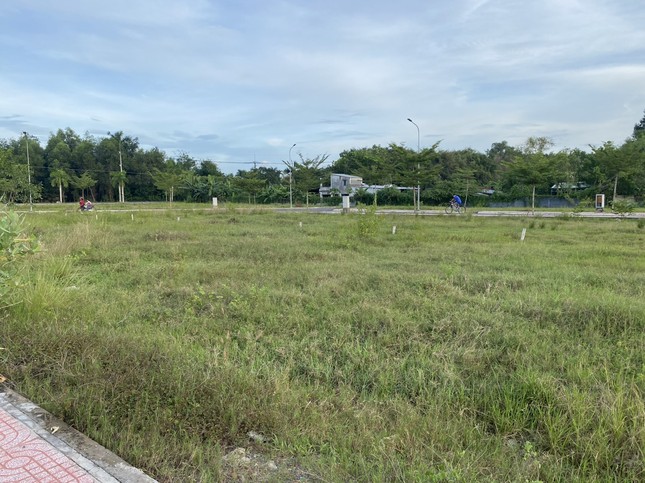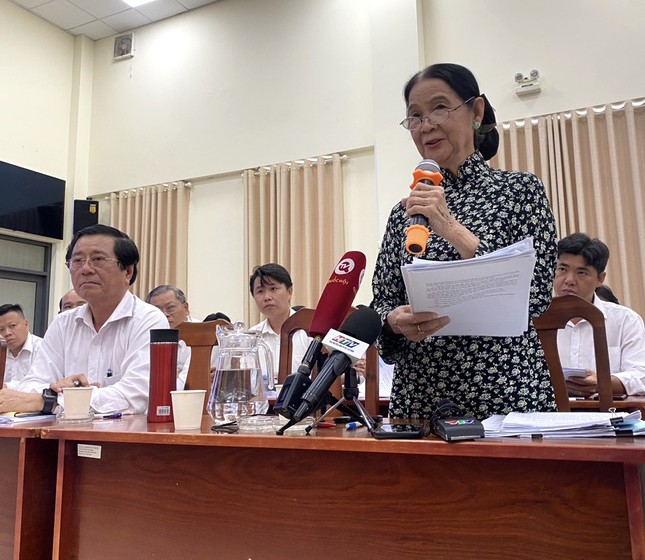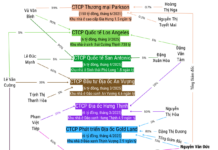Inaction is wrong
Ms. Ung Thi Xuan Huong, Vice President of the Ho Chi Minh City Lawyers’ Association, agreed with the issuance of the new land price table. However, she suggested that there should be a period for public feedback, and that each district and municipality organize a rebuttal of land prices in their respective areas to ensure a closer alignment with reality.
Currently, there is a situation where land-use conversion dossiers with financial obligations, when transferred to the tax authority from August 1st, are notified to be on hold pending further guidance. Ms. Huong affirmed that it is entirely inappropriate to suspend the resolution of dossiers for the people at this time. She requested that the Ho Chi Minh City Department of Natural Resources and Environment conduct studies and provide consultation so that the People’s Committee of Ho Chi Minh City can issue a directive to resolve the issue for the people.

It is entirely inappropriate for Ho Chi Minh City to suspend the resolution of land-related dossiers for its citizens at this time.
Ms. Huong emphasized that representatives from the Ministry of Natural Resources and Environment have confirmed that the current land price table and K coefficient will remain applicable until December 31, 2025. Therefore, the Department of Natural Resources and Environment should not worry about this matter.
“It is wrong for the tax sector to stop calculating taxes for the people because the law does not have retroactive effect,” she said. “At present, the new land price table has not been issued, and the old one is still in effect. So, taxes for the people should be calculated according to the old land price table.”
Similarly, lawyer Tran Duc Phuong, from the Ho Chi Minh City Bar Association, affirmed that Clause 3, Article 152 of the Law on Issuance of Legal Documents does not allow for retroactivity.
Specifically, Clause 1, Article 152 states: “Only in cases where it is really necessary to ensure the common interests of society, to realize the rights and interests of organizations and individuals as prescribed by law, resolutions of the National Assembly, legal documents of central agencies, may be prescribed with retroactive effect.” On the other hand, Clause 3, Article 152 stipulates, “Legal documents of the People’s Councils, People’s Committees at all levels, and local governments in special administrative-economic units shall not be prescribed with retroactive effect.”
Therefore, if Ho Chi Minh City issues a new land price table in mid-August or late August, it will only take effect and be applicable from the date of issuance, without retroactivity. As Ho Chi Minh City does not currently have a new land price table to replace the old one, the old table should be applied, and the tax authority must resolve administrative procedures for the people. The decision to halt the resolution of land-use conversion dossiers by the tax authority is inappropriate.
Lawyer Tran Duc Phuong also affirmed that Clause 1, Article 257 of the 2024 Land Law allows localities to apply the old land unit price until December 31, 2025, or adjust the land price table according to the actual situation. Thus, when Ho Chi Minh City’s adjusted land price table has not been issued, the old land price table remains valid until December 31, 2025.
“If there’s no new regulation, we are allowed to apply the old one according to Clause 1, Article 257 of the 2024 Land Law. So, why stop resolving administrative procedures and let the people suffer?” questioned Lawyer Phuong.
Who issues it?
Lawyer Truong Thi Hoa, from the Ho Chi Minh City Bar Association, stated that adjusting the land price table is necessary but must ensure a balance of interests among the people, enterprises, and a step-by-step approach with a suitable roadmap and in-depth investigation.

Lawyer Truong Thi Hoa suggested that Ho Chi Minh City should implement the old land price table until the end of December 31, 2025.
Ms. Hoa affirmed that, according to Article 159 of the 2024 Land Law, in the case of adjusting the land price table, the People’s Committee of the provincial level has the responsibility to submit it to the People’s Council of the same level for approval. In this case, the authority to adjust the land price table belongs to the People’s Council of Ho Chi Minh City, not the People’s Committee of Ho Chi Minh City.
The lawyer also disagreed with the opinion of the Ho Chi Minh City Department of Natural Resources and Environment that, before the promulgation of the 2024 Land Law, there had been a consultation with the people on removing the land price table, and this information had been made public. According to Ms. Hoa, the Ministry of Natural Resources and Environment was the agency that drafted the 2024 Land Law for consultation. The Department of Natural Resources and Environment of Ho Chi Minh City should not use this as an argument and, as the agency that drafts the land price table, must make it public and consult the people so that they are informed.
“Ho Chi Minh City should implement the old land price table until the end of December 31, 2025. It is necessary to survey and investigate the actual land price before issuing the new table, in accordance with the 2024 Land Law. The survey must be conducted according to Article 158 of the 2024 Land Law on the principles, bases, and methods of land price determination to ensure a balance of interests between the State, land users, and investors,” said Ms. Hoa.
Mr. Le Hoang Chau, Chairman of the Ho Chi Minh City Real Estate Association (HoREA), also affirmed that the authority to issue the land price table belongs to the People’s Council of Ho Chi Minh City, not the People’s Committee of Ho Chi Minh City. He requested that the Department of Natural Resources and Environment of Ho Chi Minh City submit the document according to regulations. Mr. Chau also said that while the draft land price table has some positive meanings, it also has unintended impacts on individuals and households with a need for land-use right certification or land splitting, along with land-use conversion from agricultural land or non-agricultural land to residential land, as they will have to pay a much higher land-use levy than before.
Therefore, Mr. Le Hoang Chau requested the drafting agency to pay attention to four cases. First, the case of individuals with a need for land-use right recognition, including 13,035 land plots whose users have not been granted certificates for the first time.
Second, the case of legalizing the right to use land for agricultural land and non-agricultural land interspersed in urban areas, rural residential areas, attached to houses (this part already has a pink book) within the same land lot.
Third, the case of land splitting along with land-use conversion to “residential land” to give to children and grandchildren.
Fourth, the case of individuals and households with houses and land located in “planned” areas. Mr. Chau cited the typical example of the Binh Quoi-Thanh Da project, where people have been “hanging” their land-use rights for nearly 30 years, and if the “hanging” is lifted, they will again suffer a second loss when they have to pay a very high land-use levy according to the draft land price table.
In Official Dispatch No. 8288 sent to ministries, branches, and localities to guide the implementation of the provisions of the 2024 Land Law related to the management and use of public assets, the Ministry of Finance affirmed that the land price table issued by the People’s Committees of the provincial level according to the provisions of the 2013 Land Law will continue to be applied until December 31, 2025. In case of necessity, the People’s Committees of the provincial level shall decide to adjust the land price table, and the procedure for doing so shall comply with Article 17 of Decree No. 71/2024/ND-CP of the Government on land prices.
Comprehensive regional connectivity
In addition to building strong physical infrastructure, Ho Chi Minh City needs to strengthen its soft connections with other provinces in the region in order to promote economic development. This includes prioritizing the training of skilled workforce and ensuring access to quality healthcare.
Emotional Kieu people when admiring Ho Chi Minh City from Metro Line 1
Ho Chi Minh City has undergone a remarkable transformation since the day I left. It now boasts a completely different appearance, exuding a fresh and vibrant energy. This sentiment was captured by Mr. Nguyen Duong Nam Phuong, a Vietnamese American, who was amazed by the city’s newfound liveliness.




















